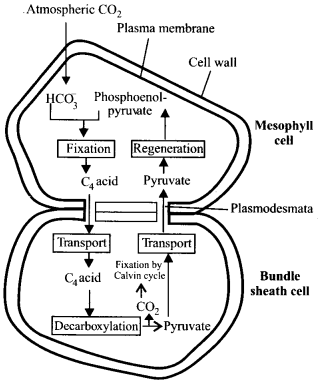plants are able to photosynthesize with no apparent photorespiration because of:
1. absence of Calvin cycle.
2. use of PEP carboxylase for primary carbon dioxide fixation.
3. absence of RuBisCO.
4. presence of tissues that do not require oxygen.
1. absence of Calvin cycle.
2. use of PEP carboxylase for primary carbon dioxide fixation.
3. absence of RuBisCO.
4. presence of tissues that do not require oxygen.
CAM plants:
1. fix carbon dioxide during the night into organic acids.
2. fix carbon dioxide into organic acids in the bundle-sheath cells during the day.
3. fix carbon dioxide into pyruvate in the mesophyll cells during the night.
4. use both photosystems I and II at night.
The process of photosynthesis has lower efficiency if photorespiration occurs because of the reduced formation of:
| 1. | AcetylCoA | 2. | 3-phosphoglycerate |
| 3. | ATP | 4. | RuBP |
Both and CAM pathways are regarded as compromises. The reason for this would be:
1. Both pathways lead to reduction of photosynthesis to enable water conservation.
2. To maintain high photosynthetic levels compromises on water loss and CAM compromises on loss of carbon.
3. Both minimize photorespiration and optimize the Calvin cycle.
4. To maintain high photosynthetic levels CAM compromises on water loss and C4 compromises on loss of carbon.
A and a plant were fed with carbon dioxide radioactively labeled with an isotope of carbon. In which of the following molecules, respectively in and plants, would radioactivity first appear as photosynthesis progresses?
| 1. | PGA and OAA | 2. | Water and PGAL |
| 3. | PGAL and Malic acid | 4. | PEP and RuBP |
The response of plants to elevated carbon dioxide levels is known as carbon dioxide fertilization effect. Which of the following would not be a consequence of such an effect?
1. rate of photosynthesis will increase
2. stomatal conductance is increased
3. mycorrhiza development will be enhanced
4. water use efficiency will increase
Radioactive carbon [] was fed to a plant during the day and after a short time was traced to oxaloacetate. The plant used in the experiment will be:
| 1. | C4 plant | 2. | C3 plant |
| 3. | CAM plant | 4. | carnivorous plant |
Carbon dioxide fixation will be inhibited by oxygen in:

1. cell I only.
2. cell II only.
3. neither cell I nor cell II.
4. both cell I and cell II.
The pathway shown in the figure will be seen in:
1. plants
2. CAM plants
3. plants
4. All photosynthetic plants
Identify the correct statement:
| 1. | The pH within the thylakoid is less than that of the stroma. |
| 2. | The pH of the stroma is higher than that of the other two measurements. |
| 3. | The pH of the stroma is higher than that of the thylakoid space but lower than that of the cytosol. |
| 4. | The pH of the thylakoid space is higher than that observed anywhere else in the cell. |







